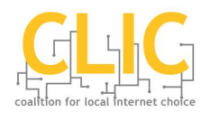
Fast, affordable Internet access for all.

In September, we wrote about the elimination of significant state barriers in Arkansas and Washington as legislators at the state level pushed to overturn the laws protecting monopoly providers which prevent localities from building and operating their own broadband infrastructure.
The result of those moves is that the number of states which maintain barriers to community-owned networks fell to 17, heralding significant progress for the future.
The same week, Coalition for Local Internet Choice (CLIC) President Jim Baller testified before the Missouri House of Representatives' Interim Broadband Development Committee to address the state of preemption across the U.S. There, he argued that the "Missouri Legislature should follow the lead of Arkansas and Washington State and repeal the restrictions in R.S.Mo. § 392.410, once and for all. It should also reject any proposed new restrictions on municipal, cooperative, or public-private broadband projects."
During the course of his remarks he makes a powerful case against "state barriers to municipal, cooperative, or public-private broadband initiatives":
[The] are not only bad for the communities involved, but they also hurt the private sector in multiple ways. They prevent private companies from making timely sales of equipment and services to municipal or cooperative networks. They impede companies from using advanced public or cooperative networks to offer businesses and residential customers an endless array of modern products and services. They thwart economic and educational opportunities that can contribute to a skilled workforce that would benefit existing and new businesses across the state. They also deny the community the economic and social benefits from which everyone in the community can benefit, including the private sector.
He continues:
At the community level, advanced communications networks, like electric utilities in the last century, have increasingly become platforms, drivers, and enablers of simultaneous progress in just about everything that matters to communities. This includes economic and workforce development, all levels of education, public safety, modern health care, smart transportation, energy efficiency and reliability, environmental protection, government service, and much more. Communities without affordable access to advanced communications capabilities will inevitably fall behind in all of these areas.
What's being done at the community level, despite the persistence of barriers?
Some are engaging with willing incumbents. Others are partnering with new entrants. Some are building their own municipal or cooperative networks. Still others are developing creative new ways to meet their needs.
While progress has been made, there remains much to be done - especially with the flood of federal funds about to be released that can go to community-led broadband infrastructure projects. It's easy to forget that we are living during a time of historic investment in our communications infrastructure, and the responsibility we have to make sure that as much of that funding as possible ends up going to locally accountable networks.
Baller's remarks are well worth the time they take to read. Read the full testimony here [pdf].
